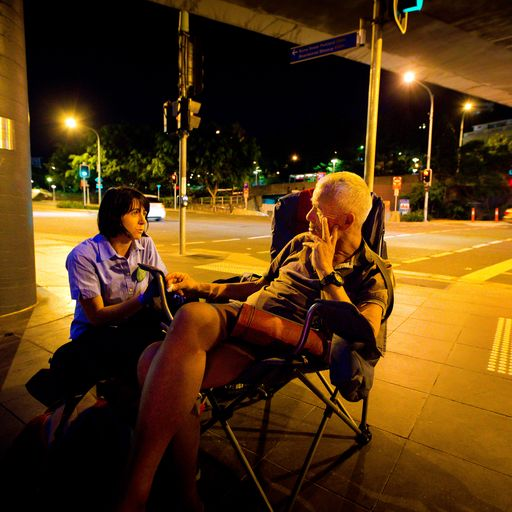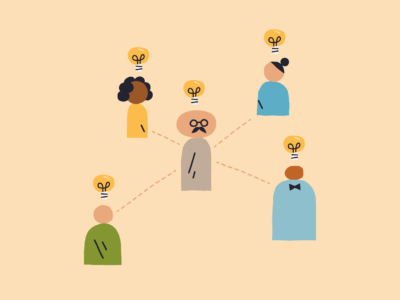Individuals experiencing unsheltered homelessness often require a unique and customized approach to engaging with health care and homeless services, prompting many communities to establish street medicine programs.
As defined by the Street Medicine Institute, street medicine includes health and social services developed specifically to address the unique needs and circumstances of individuals experiencing unsheltered homelessness, delivered directly to them in their own environment. Addressing these needs often requires practitioners to provide care outside the four walls of the hospital and meet individuals in non-traditional health care settings.
Up until late 2023, street medicine providers were limited in their ability to bill and seek reimbursement for care provided to unsheltered individuals. With the Centers for Medicare and Medicaid Services’ installation of Place of Service (POS) Code 27, street medicine providers have a new avenue for resources and funding, which is crucial for the sustainability and growth of these programs focused on providing person-centered care.
As we approach the one-year anniversary of this change, we asked several public health and health care sector experts to provide their insights on street medicine, including the new Place of Service code. Read on to see what they shared.
Responses have been edited for clarity and brevity.
What is street medicine, and what does it encompass?
“Street medicine is the direct delivery of health care to people experiencing unsheltered homelessness in their lived environment on the street, under bridges, or wherever they reside. It’s a multidisciplinary approach based on the understanding that people who are unsheltered can’t access care the way people who are sheltered or have housing do. In this way, it includes prescribers (MD/DO, PA, NP), and can include many other disciplines such as RNs, social work, peers, community health workers, and many others.”
– Brett J. Feldman, MSPAS, PA-C, Director and Co-Founder, USC Street Medicine, Associate Professor of Family Medicine, University of Southern California
“Street medicine is, at the most basic, going directly to care for those living on the streets, along the riverbanks, and in the alleys of our communities. As such, it represents a simple yet radical concept. At a deeper level, street medicine is an attempt to invert the power dynamic of conventional health care and transcend the structural violence that excludes rough sleepers by establishing an ongoing relationship of solidarity with the street community.”
– James S. Withers, MD FACP, Medical Director and Founder of the Street Medicine Institute and Pittsburgh Mercy’ Operation Safety Net, Assistant Clinical Professor University of Pittsburgh School of Medicine, Clinical Teaching faculty at the UPMC Mercy Department of Medicine, Fellowship Director, UPMC Mercy Street Medicine Fellowship
What impact does street medicine have on the population of people experiencing homelessness?
“People experiencing homelessness face insurmountable barriers to accessing traditional health care, yet have a risk of death ten times the housed population and three times the sheltered homeless population. Street medicine neutralizes those barriers by going to the people. In essence, rather than finding ways to increase access to us, we access them in an assertive way with humility and solidarity.”
– Brett J. Feldman, MSPAS, PA-C, Director and Co-Founder, USC Street Medicine, Associate Professor of Family Medicine, University of Southern California
“Strictly speaking, street medicine does not directly address the needs of all people experiencing homelessness, rather only those living outdoors. The rough sleeping population has three times the mortality rate of those traditionally cared for by Healthcare for the Homeless programs who are seen in shelters and drop-in centers.
Having practiced street medicine (long before giving it that name) since 1992, I have seen profound impacts on the capacity to care for those on the streets who often have complex and grave health care issues. The field is still evolving, and most programs do not have the capacity to conduct rigorous research on impact, but larger centers have shown benefits.
From my experience, however, I believe the ‘medical home’ model that follows rough sleepers on the streets, through hospital consults, in severe weather shelters, into housing, and back on the streets again if needed has a cumulative impact on their well-being and healing journey beyond the sum of those parts. Street medicine is essentially motivational interviewing through a deep immersion in the reality of the excluded. It recalls the house calls of earlier times.”
– James S. Withers, MD FACP, Medical Director and Founder of the Street Medicine Institute and Pittsburgh Mercy’ Operation Safety Net, Assistant Clinical Professor University of Pittsburgh School of Medicine, Clinical Teaching faculty at the UPMC Mercy Department of Medicine, Fellowship Director, UPMC Mercy Street Medicine Fellowship
For people outside of the homelessness and health world, can you explain in one sentence how the recent Place of Service (POS) Code 27 addition for Medicaid services transforms street medicine?
“Prior to POS code 27, street medicine wasn’t recognized as a legitimate form of health care delivery. When providers bill Medicare and Medicaid, they bill for what they did and where. We provide the same level of care on the street you’d expect in a clinic, so what we did was always reimbursable, but there was no ‘where’ to validate the street. With POS 27, street medicine is recognized as a legitimate form of health care delivery. By doing so, it recognizes the people who rely on it to survive.”
– Brett J. Feldman, MSPAS, PA-C, Director and Co-Founder, USC Street Medicine, Associate Professor of Family Medicine, University of Southern California
“For the first time, those living on the streets of the United States have the right to effective health care.”
– James S. Withers, MD FACP, Medical Director and Founder of the Street Medicine Institute and Pittsburgh Mercy’ Operation Safety Net, Assistant Clinical Professor University of Pittsburgh School of Medicine, Clinical Teaching faculty at the UPMC Mercy Department of Medicine, Fellowship Director, UPMC Mercy Street Medicine Fellowship
“The new POS code 27 allows clinicians to be able to bill for care given to patients on the street — such as wound care, substance use counseling, and psychiatric care — and therefore be reimbursed for these services, allowing a source of financial sustainability for the work done by street teams.”
– Katherine Koh, MD, MSc, Street Psychiatrist, Boston Health Care for the Homeless Program and Massachusetts General Hospital
“For the first time at a national level, street medicine providers have a pathway to reimbursement through Medicaid, unlocking additional services and resources.*”
*This serves as yet another example of how Medicaid programs continue to connect to Continuums of Care and housing supports. Community Solutions recently surveyed Built for Zero communities on their experiences and perceptions of these programs. You can read the report with key findings here.
– Meghan Arsenault, Senior Strategy Lead, Healthcare & Homelessness at Community Solutions, and Ben Bradley, Strategy Lead for Public Health at Community Solutions
What does a typical street medicine program look like, and how is it funded?
“Street medicine programs have been started in almost any type of organization you can imagine, including clinics, hospitals, FQHCs, and grassroots nonprofits. It’s typically funded through a patchwork of funding. In Medicaid expansion states, most patients are insured, but this patchwork didn’t include billing until recently. It’s usually funded through grants and philanthropy, which is not an equitable way to finance care to our most in-need population. We published extensively on this in the California Street Medicine Landscape Analysis.”
– Brett J. Feldman, MSPAS, PA-C, Director and Co-Founder, USC Street Medicine, Associate Professor of Family Medicine, University of Southern California
“The typology of street medicine programs is quite dynamic and evolving. To date, it has not had the status or support of, say, a fire department, though the logic of having street medicine is now nearly as compelling.
Most programs have emerged through heroic efforts by individuals and small groups based on grants, charity, and supportive mission-based parent organizations. Programs often do collaborative grants and projects that help with support. Some expand into housing and are able to utilize HUD funding. It has been a classic patchwork quilt of funding for the most part. With the new Medicaid POS code, programs can begin to reduce the financial loss that running a street medicine program entails.
A moderate-sized street medicine program typically has several teams of clinicians (increasingly PAs and NPs), street guides with street experience, and usually a health care learner who go into the streets throughout the week. Medical records are kept, and care is managed within the organization to coordinate follow-up, medical supplies, patient navigation, and hospital consults.
Ideally, an integrated primary care clinic is available if patients choose to accept traditional primary care. An administrative staff supports operations, fundraising, regulatory issues, etc. Programs organically expand for more complete care when possible and often must reduce services when necessary, but consistent street rounds must continue to remain a true street medicine program.
Future support for street medicine by hospitals and insurance companies might increase as evidence grows for cost savings (ED utilization, length of stay, readmission rates, prevention of catastrophic illness, improved health metrics on the streets).”
– James S. Withers, MD FACP, Medical Director and Founder of the Street Medicine Institute and Pittsburgh Mercy’ Operation Safety Net, Assistant Clinical Professor University of Pittsburgh School of Medicine, Clinical Teaching faculty at the UPMC Mercy Department of Medicine, Fellowship Director, UPMC Mercy Street Medicine Fellowship
“Street medicine is critically important to engage and bring people who have traditionally been excluded into a system of care. Our patients living on the street have a myriad of reasons why they do not seek medical care — severe trauma leading to difficulty trusting others, negative experiences with the health care system, or mental illness that robs them of awareness that they need help — and thus our aim is to proactively bring care to these individuals. Our street medicine team seeks to form trusting relationships with patients on the street and address their medical and psychiatric needs, ultimately connecting them to housing.”




